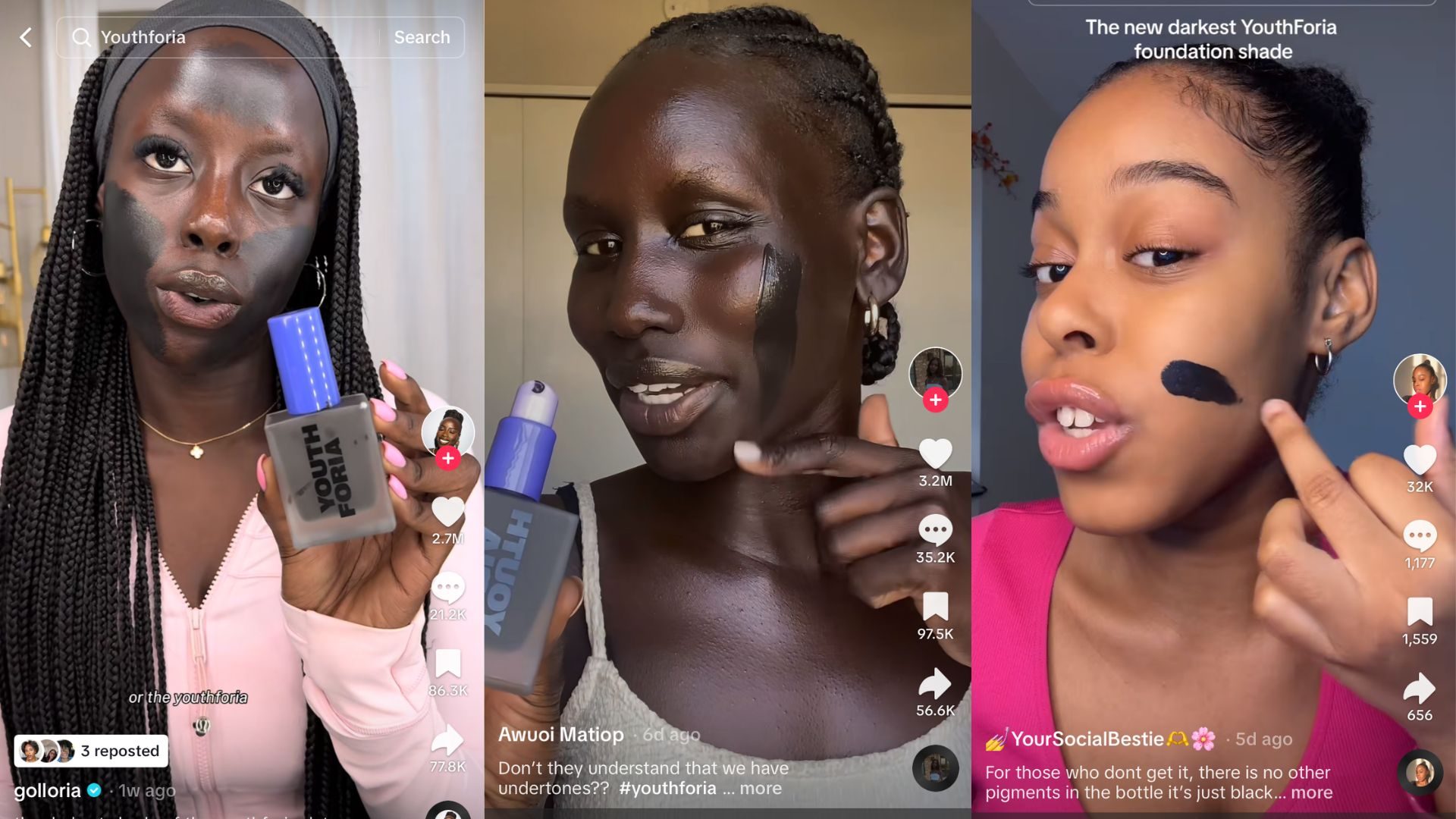
Blackface paint must have been on the mood board for Youthforia’s newest foundation shade. The brand’s misstep with their darkest foundation shade and the use of blackface paint is more than just a shade misconception. This represents a larger issue within the beauty industry. Despite efforts to promote diversity and inclusion, incidents like these highlight how far the industry still has to go in truly embracing people of all skin tones. Recently, the brand released a new foundation shade after being initially called out by beauty creators for lack of inclusion. Still, after an array of gurus on TikTok tested out the new product, they noticed the darkest shade, 600, resembled blackface paint. “This should be a crime,” Beauty creator Awuoi Matiop said in a TikTok review. “This is what we get when we ask to be included in the beauty industry.”
Blackface already has a long and painful history rooted in racism and the dehumanization of Black people. By using a shade resembling blackface paint, Youthforia perpetuated harmful stereotypes and contributed to the erasure of Black voices in the beauty community. “When we say we want you guys to make shades for us we don’t mean go to the lab and ask for minstrel show black,” Golloria George says in her review. With over 30 million views on her TikTok video, George and other Black creators are calling out Youthforia for their lack of understanding. This incident speaks volumes about the brand’s lack of leadership and highlights the need for more diverse voices at all decision-making levels in the beauty industry.
The problem goes beyond this one incident. To make it detrimental, when searching for models to test out their darkest foundation shade the team decided to do street casting instead of prioritizing the needs of Black creators who buy products. Youthforia posted a video after a user commented about their process for choosing shade 600. Still, it continued solidifying the lack of urgency for better inclusion for people with darker skin. The video showed the team of the makeup brand mindlessly searching for anyone of a deep complexion to test the product in a mall instead of doing proper research and genuinely including buyers in the beauty community.
The Youthforia Instagram account has recently limited the comment section and has yet to issue apologies and promises to do better. Since the incident occurred, the brand’s actions indicate a continued lack of commitment to true inclusion. “Create undertones and do what you need to do in the lab, so it’s a darker shade of brown,” George says in her video. It’s not just about representation; it’s about giving marginalized voices a seat at the table and listening to their input.
Unfortunately, this is not the first time a brand has missed the mark on foundation inclusion for darker skin. Still, in 2024, it’s disheartening to see brands irresponsibly use their platform and not uplift and amplify the voices of Black creators and influencers in the beauty community. This means more than just featuring them in ad campaigns; it means actively seeking partnerships and collaborations with creators and listening to what they truly need in the industry.
How do we move forward now? Youthforia should be transparent about its efforts to address the lack of inclusion within its brand and the steps it is taking to rectify past mistakes. This includes being open about any changes it is making to its product development process and its commitments to diversity and inclusion initiatives.
Ultimately, true inclusion in the beauty community requires more than surface-level gestures. Going beyond a quota requires a fundamental shift in perspective and a commitment to listening to and uplifting marginalized voices. Youthforia’s darkest foundation shade was not just a mistake but a complete disregard for the new generation of beauty lovers who still face obstacles to representation. It’s up to brands like Youthforia to take meaningful action to address this issue and work towards a more inclusive future, and Gen Z’ers will continue to be vocal and demand a better outcome.
“I’m so glad that I declined four months ago when they asked me to collaborate,” Matiop says in her video. “It’s one thing to make a mistake once, but once you make it twice, it’s just a slap in the face.”
About the Author: Kenyatta Victoria is the lead writer for Essence GU, working on all things pop culture, politics, entertainment and business. Throughout her time at GU, she’s garnered devoted readers and specializes in the Zillennial point of view.